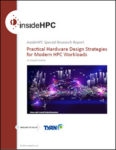BEAVERTON, OR. – January 11, 2022 – PCI-SIG, developer of the PCI Express (PCIe) standard, today announced the official release of the PCIe 6.0 specification, reaching 64 GT/s. PCIe 6.0 specification features: 64 GT/s raw data rate and up to 256 GB/s via x16 configuration Pulse Amplitude Modulation with 4 levels (PAM4) signaling and leverages existing PAM4 available […]
Microchip Technology Inc.: Introducing First PCI Express 5.0 Switches
Chandler, Ariz., February 2, 2021 – Microchip Technology Inc. (Nasdaq: MCHP) today announced what it said are the first PCI Express (PCIe) 5.0 switch solutions — the Switchtec PFX PCIe 5.0 family — “doubling the interconnect performance for dense compute, high speed networking and NVM Express (NVMe) storage,” according to the company. Together with the […]
GigaIO and Microchip Power Native PCI Express Network Fabric for Composable Disaggregated Infrastructure
Carlsbad, CA – January 17, 2021 – GigaIO, maker of data center network architecture and connectivity solutions, has announced a collaboration with Microchip Technology Inc. to power GigaIO’s FabreX, the native PCI Express (PCIe) Gen4 network fabric, which supports GDR, MPI, TCP/IP and NVMe-oF. FabreX technology revolutionizes rack-scale architectures, enabling software-defined, dynamically reconfigurable rack-scale systems, […]
Microchip Announces PCI Express 5.0 and CXLTM 2.0 Retimers
Chandler, AZ, November 10, 2020 – Microchip Technology Inc. announced today the XpressConnect family of low-latency PCI Express (PCIe®) 5.0 and Compute Express Link™ (CXLTM) 1.1/2.0 retimers. XpressConnect retimers triple the reach of PCIe Gen 5 electrical signals, which enables data center equipment providers to harness the next generational advancement in compute IO performance while […]









